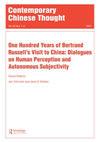“退百家唯艺”之争与对汉代儒家思想专制论的反驳
IF 0.4
3区 哲学
0 ASIAN STUDIES
引用次数: 2
摘要
编者按:过去几十年,一些学者对中国流行的儒家胜利的描述,或者用中国的话说,“摒弃百家,只敬畏儒家艺术”,提出了质疑。丁的文章不仅说明了它是如何受到挑战的,也说明了这个流行语是如何影响学术讨论的。正如他所指出的,最近中国试图颠覆传统理论的研究都有同样的“流向”。他们没有注意到,自从易白沙(1886-1921)引用这句话来严厉谴责儒家思想对中国长达几个世纪的专制统治负有责任以来,“摒弃百家,只敬畏儒家艺术”这句话就有了非常负面的含义。本文章由计算机程序翻译,如有差异,请以英文原文为准。
The Debate Surrounding “Dismiss the Hundred Schools of Thought and Revere Only the Confucian Arts” and a Refutation of the Theory of the Autocracy of Han Dynasty Confucian Thought
EDITOR’S ABSTRACT The popular Chinese portrayal of the victory of Confucianism, or in Chinese terms “dismiss the hundred schools of thought and revere only the Confucian arts,” has been challenged by some scholars in the past decades. Ding’s essay illustrates not only how it has been challenged but also how the catch phrase influences the scholarly discussion. As he indicates, recent Chinese studies that attempt to subvert the traditional theory share the same “flow.” They fail to note that the expression “dismiss the hundred schools of thought and revere only the Confucian arts” has had very negative connotations since it was invoked by Yi Baisha 易白沙 (1886–1921) to harshly denounce Confucianism for being responsible for the centuries-long Chinese autocracy.
求助全文
通过发布文献求助,成功后即可免费获取论文全文。
去求助
来源期刊

CONTEMPORARY CHINESE THOUGHT
Multiple-
CiteScore
0.10
自引率
0.00%
发文量
0
期刊介绍:
This wide ranging journal is essential reading for anyone who wants to understand the diverse themes and influences that shape Chinese thought today. It features translations of the most current and influential Chinese writings on all aspects of philosophical endeavor, from theoretical essays on systems to studies of China"s cultural and religious development, from interpretations of the Chinese classics to exegeses on Marxist thought.
 求助内容:
求助内容: 应助结果提醒方式:
应助结果提醒方式:


